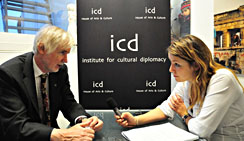"A World Without Walls":
An International Congress on "Soft Power", Cultural Diplomacy and Interdependence


read - An Interview with Mr. Tuomioja »
Dr. Erkki Tuomioja
Member of Finish Parliament and Former Finnish Foreign Minister
Dr. Erkki Tuomioja, born July 1946, is regarded as one of the most well-read politicians in current political circles in Finland. He was born into a family of politicians, with his grandmother Hella Wuolijoki being a socialist activist and his father Sakari Tuomioja a reputable liberal Finnish politician and diplomat. Prior to his political career, Tuomioja obtained his Ph.D in political science and a B.Sc. in economics. He also has a lectureship in political history at the University of Helsinki.
Before becoming a Member of Parliament, Tuomioja was a journalist and also Deputy Mayor in Helsinki. He became a Member of the Finnish Social Democratic Party in 1970-79 and then again from 1991 till the present day. Between 1991 and 1996, he was also the Vice Chairman of the SDP parliamentary group and was then made Chairman in 1996 until 1999. After this, he held the position of Minister of Trade and Industry until 2000 under the government of Paavo Lipponen. Following this, he was made Minister for Foreign Affairs when Tarja Halonen was elected President of Finland till 2007.
As a student Erkki Tuomioja took part in the student movement on 25th November 1968. Together with fellow students they occupied the Old Student House – known as Vanha ylioppilastalo – the old Students Union at Helsinki University. Inspired by other student movements around Europe at that time; the May 1968 protests in France, the “68er-Bewegung” in Germany and also the period of the Spring of Prague in 1968, the students demanded democratic reforms to the university’s administration, Marxist-Lenin study circles in departments, and demanded the alteration of the political alignment of the monthly student magazine Ylioppilaslehti. It was also known to be a revolt against the values of the older generations.
He was also involved in the anti-war group, Committee of 100 of Finland, and took part in the Erik Schüller case, in which a group of students publicly condemned mandatory conscription. Despite his involvement, he still had to carry out his military service and is a reservist sergeant.
Tuomioja was the Finnish Foreign Minister while Finland held the EU Presidency in 2006, during which he played a prominent role in EU foreign policy. It is known that he was one of the first to demand the cease–fire in the Israel–Lebanon conflict in 2006. Often making appearances at political conferences, he discloses that understanding globalisation is critical to understanding today’s world and maintaining peace in foreign policy. In a speech at the University for Peace in Costa Rica November 2001, he explains that “Globalisation is not only unavoidable but a process, which, on the whole, opens up more positive prospects than new threats.” Globalisation has undoubtedly resulted in a crucial interdependence between countries, which has in turn developed a new rise of wealth and prosperity. However, threats due to globalisation, such as environmental and social/cultural damage, unequal distribution of wealth globally, an increase of marginalisation and inequality among people—often resulting in international or regional conflict—are not to be underestimated. Cooperation between national governments, a common global governance, particularly in the United Nations and at the regional level of the EU are essentials in managing these threats.
The terrorist attacks of 11th September have greatly changed the way security is viewed. Not only must we concentrate on inter – state conflicts but also, conflicts within a certain state, terrorism, drugs, disease, international crime and human rights violations. On a more positive note, it is clear that as nations, there is more to unite us, than to divide us. Regional and global security can only be completely achieved through an increase of international cooperation. Non–military means of conflict prevention, crisis management and post–conflict rehabilitation are all vital tools to be implemented by the international community and it is clear that in this globalised world, crises cannot be dealt with unilaterally. Thus, he states that the role of the Organisation for Security and Co-operation in Europe has become even more indispensable. It is clear that Tuomioja has contributed a great deal of political thought to pressing issues in foreign affairs.
Not only is he a formidable politician, he is also the author of 18 books, including Europe and the Nordic Fringe published in 1991. He has also written a book about his grandmother and her sister – A Delicate Shade of Pink – which won the Non-Fiction Finlandia prize in 2006.





















































































